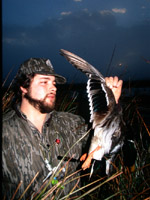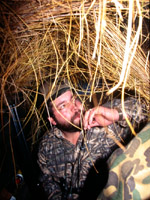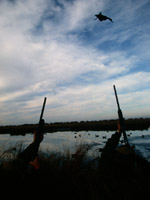
|
Features
|
|
|
|
Books
|
|
|
|
Fun & Games
|
|
|
|
Contact Us
|
|
|
John's Journal... Entry 117, Day 1
DUCKS WHEN THE WEATHER SIZZLES
Hunting Warm-Weather Ducks
 EDITOR'S
NOTE: Like most duck hunters throughout the nation in the warm weather
of this past few seasons, I didn't hear the whistling wings of waterfowl
gliding out over the marsh, the constant quacking of mallards as they
fed in acorn flats or the whistling of wood ducks as they came in to roost
at night. Instead, the ever-present hum of mosquitos' wings -- millions
of them -- overpowered all the other sounds. However, while this past
year brought unseasonably-hot weather and many areas didn't see as many
ducks as they'd seen in other years, the sportsmen who knew how, where
and when to hunt quacks still found numbers of webfoots and took limits
of ducks, even though they may have killed over their limits of mosquitos.
EDITOR'S
NOTE: Like most duck hunters throughout the nation in the warm weather
of this past few seasons, I didn't hear the whistling wings of waterfowl
gliding out over the marsh, the constant quacking of mallards as they
fed in acorn flats or the whistling of wood ducks as they came in to roost
at night. Instead, the ever-present hum of mosquitos' wings -- millions
of them -- overpowered all the other sounds. However, while this past
year brought unseasonably-hot weather and many areas didn't see as many
ducks as they'd seen in other years, the sportsmen who knew how, where
and when to hunt quacks still found numbers of webfoots and took limits
of ducks, even though they may have killed over their limits of mosquitos.
 Most
hunters ranked the past few year's duck seasons as some of the most unusual
the nation ever had seen. Because of warm temperatures, the numbers of
ducks actually coming down the Mississippi Flyway seemed fewer than the
numbers expected. Even when the ducks reached the South, hunting expectations
didn't match pre-season predictions because the ducks that did come South
didn't fly very frequently.
Most
hunters ranked the past few year's duck seasons as some of the most unusual
the nation ever had seen. Because of warm temperatures, the numbers of
ducks actually coming down the Mississippi Flyway seemed fewer than the
numbers expected. Even when the ducks reached the South, hunting expectations
didn't match pre-season predictions because the ducks that did come South
didn't fly very frequently.
I hunted saltwater-marsh ducks with Rod and Eli Haydel of Haydel's Game
Calls in Cameron Parish just outside Lake Charles, Louisiana, near the
Gulf of Mexico. With temperatures in the 70s in early November, I doubted
my hunting companions and I would see and take many webfoots. "During
warm-weather conditions, birds don't have to move very much or feed very
often," Rod Haydel explained. "If you want to take a limit of
ducks in many areas, you should pack a lunch. Often ducks won't move until
later in the morning. In regions where you normally will have a hunt lasting
an hour or two before you bag a limit, you may have to stay until noon
or later, depending on the bag limit and regulations in that area. If
you hunt with a mobile blind during warm weather, you can move to sites
ducks seem to use and often find some pretty good shooting. But if you
hunt from a permanent blind, a day seems to last forever, with only sporadic
shooting."
 In
the Louisiana marsh where we hunted ducks first, we had to arm ourselves
with industrial-strength Yard Guard and spray it in and on our duck blinds
before we could climb into them because of the huge numbers of fat mosquitoes.
If the ducks along the Mississippi Flyway had eaten all the mosquitos
available, they never could have lifted off the water to fly back north
in the early springtime. The long-sleeved shirt I wore not only camouflaged
my body but also kept mosquitos off my skin after I had saturated the
shirt with bug repellant. However, the Haydels felt confident we would
see and bag ducks. And before the morning ended, we had some of the finest
saltwater marsh shooting I'd experienced in many years.
In
the Louisiana marsh where we hunted ducks first, we had to arm ourselves
with industrial-strength Yard Guard and spray it in and on our duck blinds
before we could climb into them because of the huge numbers of fat mosquitoes.
If the ducks along the Mississippi Flyway had eaten all the mosquitos
available, they never could have lifted off the water to fly back north
in the early springtime. The long-sleeved shirt I wore not only camouflaged
my body but also kept mosquitos off my skin after I had saturated the
shirt with bug repellant. However, the Haydels felt confident we would
see and bag ducks. And before the morning ended, we had some of the finest
saltwater marsh shooting I'd experienced in many years.
TOMORROW: SALTWATER-MARSH DUCKS
Check back each day this week for more about Ducks...
Day 1 - Hunting Warm-Weather
Ducks
Day 2 - Saltwater-Marsh Ducks
Day 3 - Freshwater-Marsh Hunting
Day 4 - Field Hunting
Day 5 - Great Lakes Ducks